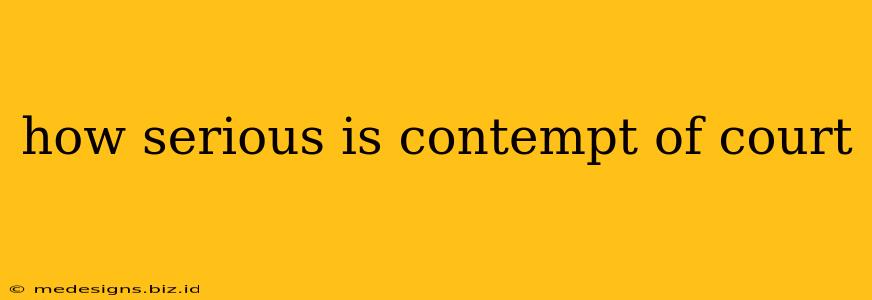Contempt of court is a serious offense that undermines the authority and integrity of the judicial system. It's crucial to understand the gravity of this charge and the potential consequences you face if found guilty. This article explores the seriousness of contempt of court, outlining different types and penalties.
What Constitutes Contempt of Court?
Contempt of court broadly refers to any act that shows disrespect or defiance towards a court's authority. This can manifest in various ways, broadly categorized as:
1. Direct Contempt:
This involves actions committed in the presence of the court, such as:
- Disruptive behavior: Loud outbursts, refusing to follow instructions from the judge, or physically assaulting someone in the courtroom.
- Disrespectful language: Using abusive or insulting language towards the judge, jury, or other court officials.
- Refusal to testify: Willfully refusing to answer questions under oath, unless legally protected by privilege.
- Interfering with court proceedings: Intentionally disrupting the proceedings, for example by bringing in unauthorized materials or causing a disturbance.
2. Indirect Contempt:
This involves actions committed outside the court's immediate presence, but which still obstruct or interfere with the court's proceedings. Examples include:
- Failure to comply with court orders: Ignoring a court order, such as failing to pay child support or refusing to release documents.
- Witness tampering: Influencing or attempting to influence a witness to change their testimony.
- Bribery: Offering bribes to court officials or jurors.
- Publishing material that interferes with a trial: This could include pre-trial publicity that might prejudice a jury.
Penalties for Contempt of Court
The penalties for contempt of court vary depending on the severity of the offense and the jurisdiction. Penalties can range from:
- Fines: Monetary penalties can be substantial, depending on the nature and impact of the contempt.
- Jail time: For more serious instances of contempt, imprisonment is a possibility. This can range from a few days to several years.
- Community service: In some cases, community service may be imposed as a penalty.
- Other sanctions: The court may issue other sanctions, such as striking pleadings or dismissing a case.
The Severity of the Punishment:
The seriousness of the penalty is directly proportional to the seriousness of the act of contempt. A minor, unintentional act might result in a warning or a small fine. However, a willful and deliberate attempt to obstruct justice can lead to significant fines and imprisonment.
Seeking Legal Counsel
If you've been accused of contempt of court, it's crucial to seek legal advice immediately. A qualified attorney can explain your rights, help you understand the charges, and represent you in court. The consequences of a contempt conviction can be severe, impacting your freedom, reputation, and finances. Don't hesitate to contact a legal professional for guidance.
Conclusion: Respect for the Court System
Respect for the judicial system is paramount for a functioning democracy. Contempt of court is a serious offense with potentially serious consequences. Understanding what constitutes contempt and the potential penalties is vital for anyone interacting with the legal system. By respecting the court's authority and following its procedures, individuals can contribute to maintaining the integrity and fairness of the judicial process. Remember, ignorance of the law is not a defense.
